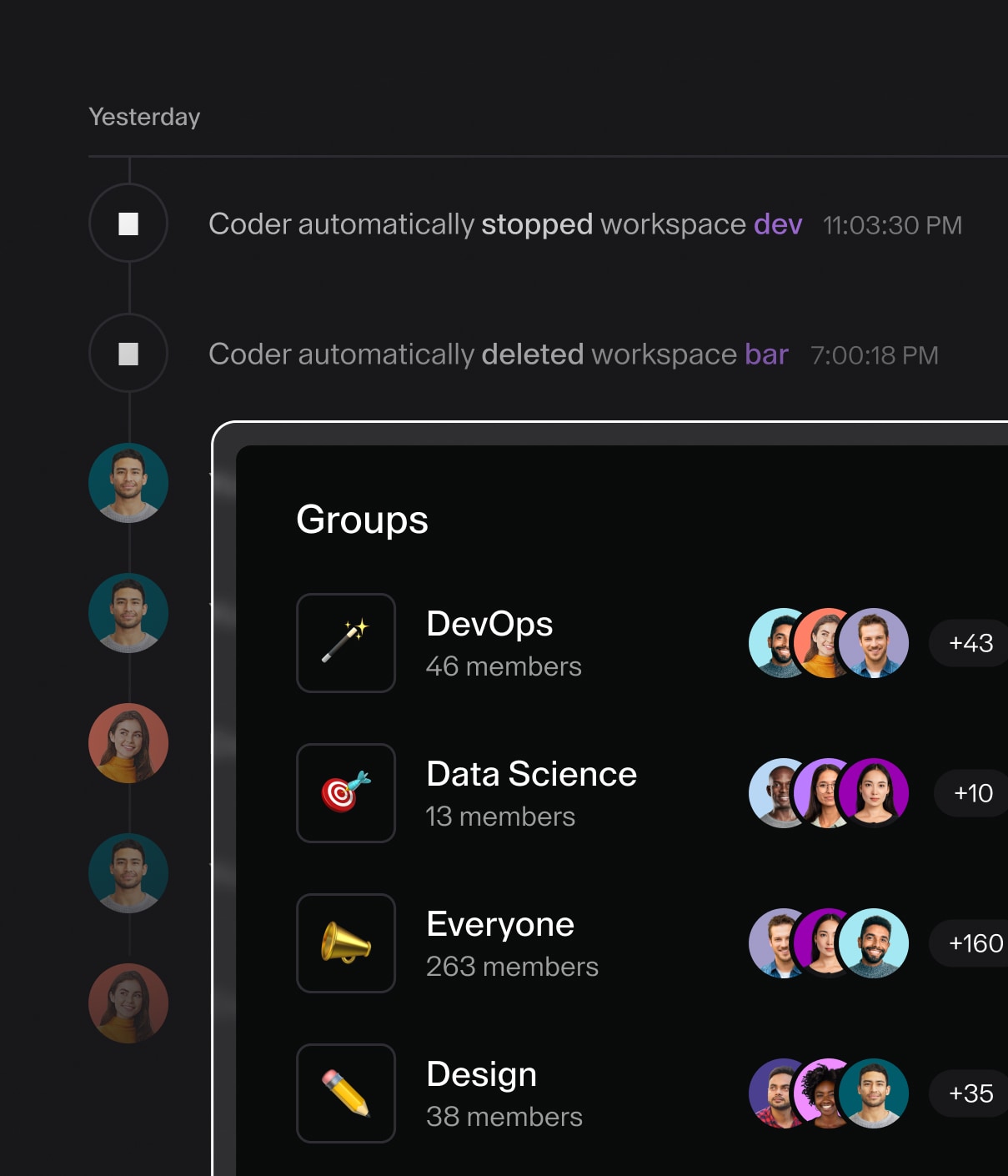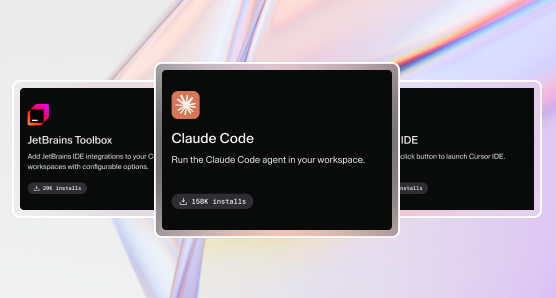Coder vs. Gitpod: Which is better for your team?


Gitpod and Coder both provide developers with reproducible, powerful, cloud-based developer environments or workspaces, but they differ dramatically in their target audience: While Gitpod appears to be focused on individuals or small teams by way of a SaaS offering only, Coder is focused on making cloud development available to the enterprise, with a self-hosted on-premises and public cloud solution.
Here's how to choose the best fit for your development team.
Why remote development
Today most developers have their IDEs on their local machines. There is a growing interest in moving development workspaces and IDEs to the cloud, which solves some key problems for organizations while also offering advantages for the developer:
start coding on day one — developers often spend hours or days setting up a development environment on a local machine before they can make their first commit. With cloud-based workspaces, fully configured workspaces are available for developers to start contributing immediately.
secure source code — individual devices remain the least secure endpoint in the software development pipeline. With local development, source code and data are cloned to individual workstations, creating security risks. With cloud-based workspaces, source code and data remain within the organization’s infrastructure.
less drift — dependency and configuration drift in the development environment results in broken environments and builds, i.e., the classic “it works on my machine” problem. Reproducible, cloud-based developer workspaces ensure that everyone is working with the same basic configuration.
greater compute power — cloud development eliminates the need to focus on local hardware. Need more processing power? Add more cores to your instance—or a GPU.
remote access — because development environments are in the cloud, developers can access them securely from wherever they are.
Gitpod: Easy to get started, but only hosted SaaS
Gitpod is very focused on the developer experience. Getting started with Gitpod is easy. In fact you can launch a new workspace for a project by navigating to https://gitpod.io/#repo-url. Like Coder, they developed (and open-sourced) a fork of VS Code suited for the web browser. Using a familiar IDE makes it simpler for developers to transition to remote development, since they do not need to learn new shortcuts, extensions, etc. Gitpod also supports different IDEs beyond VS Code in the web browser. Developers can choose between VS Code (Web), VS Code (Local), and beta support for IntelliJ IDEs to write code.
Gitpod’s opinionated model for development environments can work well for new projects and small teams building web applications. All workspaces are ephemeral, run in containers, and new workspaces can be created for each task (feature, bugfix, code review) a developer does.
There is a growing list of hosted SaaS offerings from larger, more established suppliers like GitHub Codespaces, Amazon CodeCatalyst, Microsoft Dev Box, and soon GitLab.
Coder: Supporting enterprises, on their infrastructure
While Gitpod has a single-tenant SaaS offering option, it has discontinued support for a self-hosted offering like Coder. Coder continues to only be a self-hosted offering because our target customers, larger enterprises, prefer this flexibility and security to run Coder on-premises or in their public cloud.
One example is multi-cluster and workspace infrastructure support. With Coder, workspaces can be provisioned on whatever Kubernetes, Docker or VM infrastructure you prefer, so developers can develop remotely with low-latency wherever they are on the globe. This is particularly useful for organizations that may have teams of developers that are geographically distributed. Coder supports other enterprise-grade features such as built-in single-sign-on, an audit log, configurable workspace resources, quotas, and usage metrics.
Coder supports different types of workspace infrastructure. While Coder can run on Kubernetes, it is not required. Coder also runs on Docker and VMs. The Coder control plane can also run on a laptop, a VM or Kubernetes.
Enterprises can confidently deploy Coder at scale in their organization, measure its adoption, and configure their deployment to match requirements for different teams.
With that being said, the developer experience with Coder is not an afterthought. Coder supports multiple IDEs, full Linux desktop, container and VM development (including Windows and Visual Studio or macOS), GPU support, REST access, CLI access, and personalization to enable developers and teams to move their existing workflows to remote workspaces.
| Coder | Gitpod | |
|---|---|---|
| Try in seconds (laptop) | ✅ | |
| Try in seconds (cloud SaaS) | ✅ | |
| SaaS version | ✅ | |
| Self-host (Docker) | ✅ | |
| Self-host (Kubernetes) | ✅ | |
| Self-host (Multi-region) | ✅ | |
| Organizations/teams | ✅ | ✅ |
| SSO Support | ✅ | ✅ |
| Usage metrics | ✅ | |
| Audit log | ✅ | |
| Configurable workspace resources and limits | ✅ | |
| GitHub, GitLab, Bitbucket integration | ✅ | ✅ |
| Use VS Code IDEs | ✅ | ✅ |
| Use JetBrains IDEs | ✅ | ✅ |
| Custom apps and IDEs | ✅ | |
| Docker in workspaces | ✅ | ✅ |
| GPUs in workspaces | ✅ | |
| Configure workspace images and templates | ✅ | ✅ |
| Workspace pre-builds | ✅ | |
| Workspace snapshots | ✅ | |
| CLI | ✅ | ✅ |
| REST API | ✅ | |
| Collaboration | via third-party IDE extensions | ✅ |
Next steps
See our documentation or sign up for a trial. You can also request a demo of Coder or request to speak with Sales about licensing and pricing.
Gitpod is also easy to try, you can try their SaaS
Subscribe to our newsletter
Want to stay up to date on all things Coder? Subscribe to our monthly newsletter and be the first to know when we release new things!


